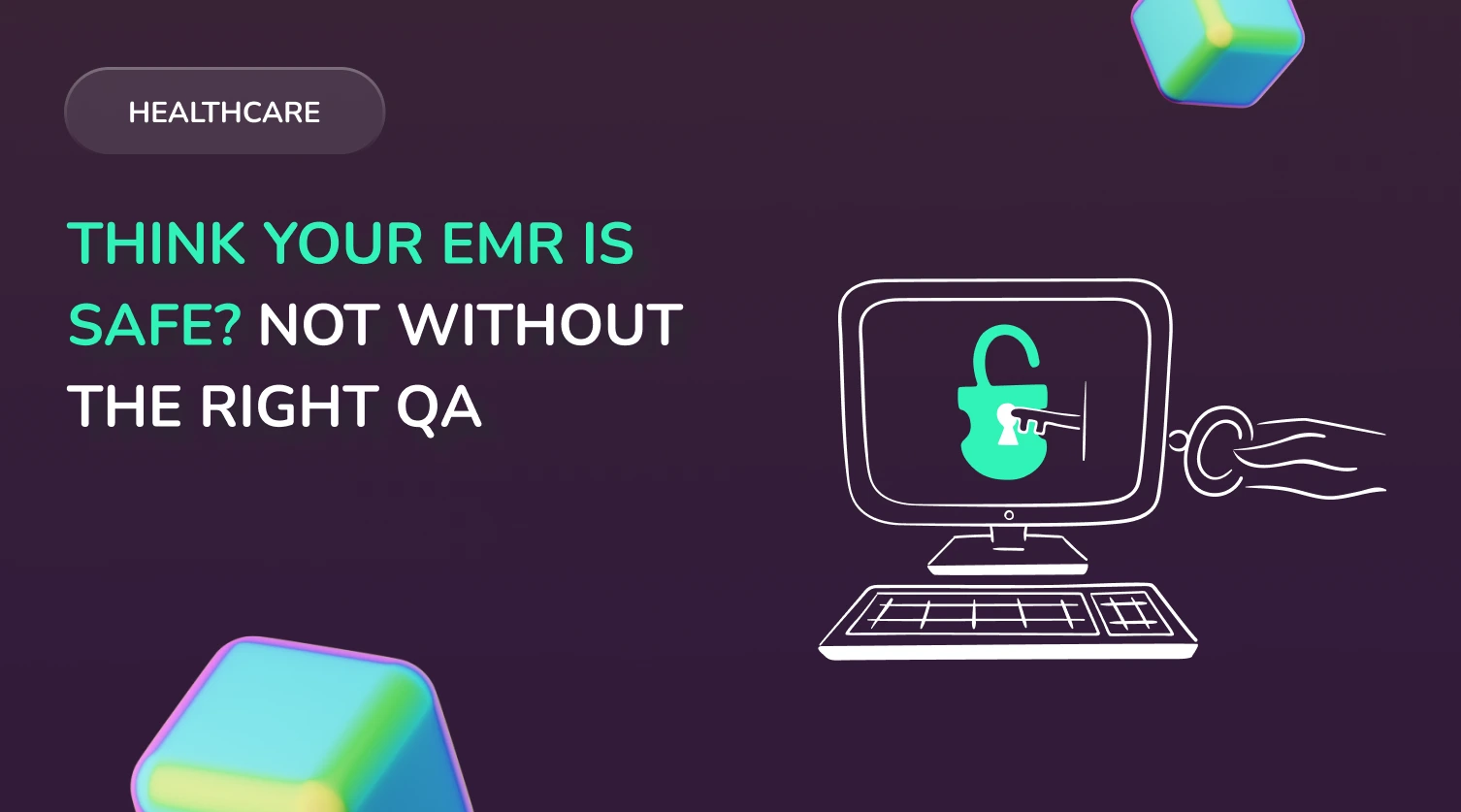
Have you ever had that moment when everything seems to work — until it doesn’t? You invested in developing an EMR, automated workflows, and reduced paperwork, and the team proudly shows you beautiful dashboards and interfaces. Everything looks great — until two weeks later, a doctor reports that a patient’s allergy info is missing. Or the system freezes during peak hours. Patients complain. Doctors get frustrated. And your reputation? It starts to crack — little by little.
How is that possible if “everything works”?
If you’re reading this article, chances are, you already know the hard truth: in healthcare, there are no small mistakes. Every technical decision can either support great service or put lives at risk. And the most vulnerable part of any medical software isn’t the features or the design — it’s the part that was never properly tested.
This is where quality assurance in healthcare becomes your strongest shield.
💬 As Donald Miller said in his book “Building a StoryBrand”:
If you confuse, you’ll lose. Noise is the enemy, and clarity is the solution.
He explains that they will walk away if your system makes people think too hard or guess what to do. In healthcare software testing, clarity and reliability win patient trust and provider confidence. And that’s exactly what good QA does: it protects your medical product from chaos.
In this article, you’ll learn:
- Why QA is not just an “extra step,” but a critical part of risk management and cost protection in software testing in the healthcare domain.
- Common hospital quality assurance mistakes in EMRs and how they can damage your business.
- What should be tested but is often ignored in healthcare application testing?
Most importantly, I will explain why professional QA is the foundation for scalable, reliable eHealth systems.
If your goal is a dependable, scalable, and patient-focused digital healthcare product, keep reading. You’ll see why QA in healthcare determines whether your product will become a trusted tool for doctors or a constant headache for management.
What Is QA in Healthcare
When you launch a medical software product, whether an EMR, a telemedicine platform, or a lab results system, you’re responsible for accurate medical data, patient safety, and the stability of clinical business operations. It’s not just an IT product. It’s a critical tool where lives, licenses, and reputations are directly at stake.
That’s where QA in healthcare comes in Quality Assurance. Simply put, quality assurance in healthcare is not just a “final check before release,” but an ongoing process of identifying weak points before they become real risks.
Unlike basic “does the program work?” checks, QA healthcare is a comprehensive process that considers:
- real-life behavior of doctors and patients,
- critical medical data like allergies, dosages, and chronic conditions,
- integrations with labs, pharmacies, and insurance systems,
- compliance with standards like HIPAA, HL7, GDPR,
- and performance during peak system loads.
For example, imagine a doctor logging into the EMR to prescribe antibiotics urgently, but the patient’s penicillin allergy doesn’t show up. The medication is given, an allergic reaction occurs, and now there’s a complaint and investigation. The software “worked,” but a data display bug led to a serious failure. That’s the kind of issue that only a medical QA specialist, who tests software from a real doctor’s perspective, would catch.
As a business owner, you can use healthcare QA as a safety net — protection against critical errors, lawsuits, and most importantly, a foundation of trust. Solid software testing in the healthcare domain allows you to scale, enter new markets, and pass audits with confidence.
If you’re thinking about growth, insurance partnerships, certifications, or data safety, start with quality assurance in hospital systems. It’s the foundation your entire platform is built on.
What an Effective QA Process in eHealth Should Look Like
In healthcare, mistakes are unacceptable, and in digital healthcare, even small errors can affect lives. That’s why quality assurance in eHealth should be a continuous and well-structured process, not a one-time event.
It starts with a deep analysis of business requirements. At this stage, the QA healthcare specialist looks at how the system should function from a doctor’s and a patient’s perspectives. Then, test cases are created with detailed scenarios to check how each system feature behaves. This helps identify risks before development even begins.
After implementing new features, healthcare application testing includes functional testing to ensure everything works as intended. Next is load testing, can the system handle high volumes of users during busy hours?
Cross-browser and cross-platform testing is also critical, especially for testing healthcare applications accessible via browsers and mobile apps. If the system collects or transfers personal medical data, security testing is a must to protect patient privacy and meet standards like HIPAA.
Types of Healthcare Software Testing That Matter
Before every release, regression testing checks that updates haven’t broken existing features. After release, post-deployment monitoring helps catch unexpected bugs quickly.
A QA engineer in healthcare isn’t just a “tester.” They’re a translator between medical business needs and development teams, helping ensure real problems are solved. This requires the right tools.
Tools for QA in Healthcare Projects
Here are some proven tools used in healthcare software testing:
- Postman — for API testing
- JMeter — for performance and load testing
- Selenium — for UI automation testing
- TestRail — for managing test documentation
- Plus HIPAA-compliant tools for sensitive data testing
When your healthcare QA process is done right, you can be confident: your product won’t let doctors down, frustrate patients, or break the law. That’s the path to real success in digital health.
Why EMRs and Medical Services Need a Special QA Approach
Healthcare is not just another industry
In regular web applications, a bug may cause user frustration. However, in healthcare systems, a failure can lead to a wrong diagnosis, a missed allergy warning, or even a life-threatening situation. Electronic Medical Records (EMRs) and other medical services deal with critical, life-saving information. That’s why they require more than just checking if a screen opens — they need deep validation of logic, accuracy, and system stability.
This is where quality assurance in healthcare becomes essential. It goes far beyond basic testing. It means thoroughly verifying how the system behaves in real clinical scenarios and ensuring safety at every step.
Integrations and load — weak points without QA
Healthcare applications rarely operate in isolation. They are integrated with laboratories, insurance systems, pharmacies, and third-party analytics or medical services. Every integration point is a possible risk area. A single error in an API call can lead to incorrect data in a patient’s chart. That’s why healthcare application testing and testing healthcare applications must be done carefully, especially in complex system environments.
On top of that, medical systems must handle high traffic. Think about a hospital registration desk in the morning or remote appointments with multiple doctors using the system at once. Without proper software testing in the healthcare domain, especially load testing, even a “stable” system might crash during peak usage.
Standards and regulations — not a suggestion, but a requirement
Regulations like HIPAA in the U.S., GDPR in Europe, and other local healthcare laws are not optional. QA in healthcare helps identify compliance issues before audits happen. With medical QA, it becomes possible to test how secure and compliant the system is with patient data protection standards.
Important areas of compliance include:
- Availability: The system must always be accessible, especially in emergencies.
- Confidentiality: Patient data must never be leaked or shared incorrectly.
- Access control: A doctor should only see data related to their patients.
These aspects are a key part of quality assurance in hospital settings and fall under hospital quality assurance standards.
QA in healthcare = trust and growth
For a business owner, QA healthcare is a way to build a reliable, scalable, and certifiable product. It’s not just about bug reports. It’s about doctors trusting your system, patients feeling safe with their data, and investors or partners seeing long-term stability and professionalism.
Healthcare software testing is not just a technical necessity — it’s a business and ethical responsibility. With a well-established healthcare QA process, your product can confidently grow, pass certifications, and enter new markets.
The conclusion is simple: In healthcare, the cost of a mistake is too high to ignore, and there is a need for quality assurance examples in healthcare, as well as the need for detailed software testing in the healthcare domain. Every critical feature must be tested thoroughly, because people’s lives depend on it.
Common Issues Identified by QA (Real Examples)
At first glance, your medical system might seem to be working fine — screens load, forms submit, and data fills the database. But real-life usage often tells a different story. This is where QA in healthcare plays a critical role — not just as a bug hunter, but as a strategic layer that protects against risks and reputational damage.
Here are some real-world examples that are all too familiar to many owners of healthcare solutions:
Internet connection issues = data loss
In cases of unstable connections (for example, in rural clinics or during home visits), the EMR fails to save important data: diagnosis, test results, and prescriptions. The patient leaves thinking everything is recorded, but the server never receives the information. This isn’t a functional bug — it’s a flaw in how the system handles offline mode, which is only discovered through proper healthcare software testing under weak network conditions.
Crashes during simultaneous access
When a doctor, nurse, and front desk staff access the patient record at the same time, the system slows down or even loses updates. This happens if concurrent requests and data synchronization weren’t properly tested. It’s a typical case in testing healthcare applications, where high concurrency must be handled safely.
Critical alerts delayed
A patient’s condition worsens, but the doctor receives the alert too late. The issue is not that “something stopped working,” but that the trigger mechanism and event prioritization were poorly configured or can’t handle system load. These kinds of failures are exactly what medical QA is meant to catch.
Inconsistencies between platforms
The doctor sees one version of the record on the desktop, while the patient sees something different in the mobile app. For instance, new test results show up on the web but not in the app. This is often caused by unsynchronized APIs, caching issues, or version mismatches — problems that only show up during cross-platform healthcare application testing.
These are not just technical bugs. They are real scenarios that affect service quality, patient trust, legal safety, and clinic reputation. They don’t show up during simple checks — only when the product is tested as a complete system in realistic conditions. That’s why QA healthcare is an investment in business stability, not just in “testers.”
Strong software testing in the healthcare domain and clear quality assurance in healthcare processes help prevent these issues before they reach patients or doctors. Organizations can reduce errors and improve outcomes through healthcare QA and structured hospital quality assurance.
In short, these quality assurance examples in healthcare show why quality assurance in hospitals and beyond isn’t optional — it’s what makes your healthcare product truly reliable and ready for real-world use.
What Should Be Tested And What Often Gets Ignored
When launching a healthcare product, everything might seem fine at first glance — buttons work, forms are submitted, and no errors appear. But this is just the tip of the iceberg. Most serious issues are hidden deeper, in areas that often go unnoticed without proper quality assurance in healthcare.
Here’s what is frequently overlooked — and why it matters:
- Load testing scenarios
Your EMR may run smoothly… while only two doctors are using it. But what happens during the morning rush, when 100 users are logged in at the same time? The system may crash or slow down so much that it defeats the purpose of digitalization. Without stress testing healthcare applications, such problems stay hidden until the complaints begin to flood in.
- Edge cases
What if a patient has six chronic conditions, ten prescriptions, and two supervising doctors? Will everything display correctly in the medical chart, schedule, and billing system? Surprisingly, such real-life cases are often not covered during healthcare application testing. The product might perform well under “standard” conditions but fail when used outside the template.
- Security and confidentiality
Can a front desk clerk accidentally access another patient’s chart? What if a doctor forgets to log out on a shared computer? These are not hypothetical questions — they happen regularly. This is where medical QA plays a vital role, simulating risk scenarios and testing vulnerabilities. In the context of HIPAA or GDPR compliance, one data breach can mean not only reputation loss but also serious fines. This is why QA in healthcare must cover security as a priority.
- Usability during real consultations
A doctor talks to a patient, holds a tablet in one hand, and enters data with the other. Is the interface user-friendly? Does it slow the workflow? How many clicks does it take to prescribe medication? This is more than just “design” — it impacts appointment efficiency, staff burnout, and ultimately, patient satisfaction. Healthcare software testing must include real-world usability checks.
If you only test whether “buttons work,” you’re seeing no more than 30% of potential issues.
Effective QA healthcare isn’t just about turning things on — it’s about understanding how your system behaves under real, stressful, and complex conditions. This is where your competitive advantage lies: in healthcare QA that delivers resilience, reliability, and user trust — things you can’t see in a demo but matter most in real-world use.
Why You Should Delegate QA to Professionals
Instead of Relying on “We’ll Check It Ourselves”
Many healthcare product owners believe that it’s enough to check if data entry and form submission work. But quality assurance in hospital settings goes much deeper. It’s about understanding how your software performs in real clinical environments, where accuracy and speed can affect patient health, or even save lives.
Professional QA in healthcare is not just about “clicking buttons.” QA engineers understand the medical context — they know which user scenarios matter most to doctors and nurses. They can replicate real hospital situations and notice critical details that developers might overlook. They create testing strategies tailored specifically to the medical domain, not just using generic test templates.
Experienced QA specialists also ensure that software testing in the healthcare domain complies with legal and regulatory requirements — a must for launching and operating healthcare products legally. Security of patient data and compliance with standards like HIPAA and GDPR are essential. These risks are often underestimated by teams without experience in hospital quality assurance.
From manual testing and UX evaluations to automated checks, QA experts build a complete quality process that speeds up release cycles and reduces the risk of introducing new bugs. This is especially important for testing healthcare applications where reliability can’t be compromised.
For business owners, investing in healthcare software testing is not a cost — it’s a strategic decision. Delegating QA to professionals helps avoid costly errors, reputational damage, and breakdowns that may be far more expensive than expert services.
In short, strong quality assurance examples in healthcare prove that with the right testing in place, your EMR and other digital solutions will perform properly, even under the most challenging and critical conditions. This is the real value of QA healthcare: building products that are trusted, secure, and ready for real life.
How to Know If Your QA Is Working Properly
To understand whether the quality of your healthcare software is truly under control, ask yourself a few simple but important questions. First, who is responsible for quality assurance in healthcare during all stages of development and after release? It shouldn’t be just a developer or a project manager — it should be a dedicated QA specialist or a medical QA team ensuring everything works smoothly, not just at launch but also after updates.
Second, do you have clear documentation for healthcare software testing? Not just simple checklists, but detailed test cases and scenarios that describe how the system should behave in different situations — from everyday tasks to emergency events. Without this, it’s easy to miss critical errors.
And finally, does your testing go deeper than just “clicking buttons”? This includes performance testing (to check how the system handles many users at once), security tests (to prevent unauthorized access to sensitive data), and usability evaluations for medical staff. If these steps are missing, you’re likely not covering what really matters in healthcare application testing.
❗ If you can’t confidently answer these questions, it’s time to rethink your approach to QA in healthcare. It affects not only the technical stability of your platform but also patient safety, your business reputation, and long-term financial health.
QA Is Not Just About Tests. It’s About Trust and Business Stability
Even small software glitches in digital health can lead to serious consequences — loss of patients, damaged reputation, legal risks, and financial losses. Proper QA in healthcare is your invisible shield that protects your EMR and other medical services during both growth and crisis.
If you plan to scale your product, you must be confident that your healthcare QA is 100%. The best way to achieve this is by trusting professionals who understand the specifics of software testing in the healthcare domain.
These experts will perform functional tests and handle hospital quality assurance, simulate real-life scenarios, ensure quality assurance in hospital settings, and meet legal standards like HIPAA or GDPR. Their focus on testing healthcare applications and providing quality assurance examples in healthcare helps you avoid costly mistakes and win the trust of patients and doctors.
A reliable QA healthcare process isn’t just a checkbox. It’s a strategic investment in your app’s performance, security, and reputation — the pillars of your business success in the competitive healthcare industry.
Subscribe to our blog


